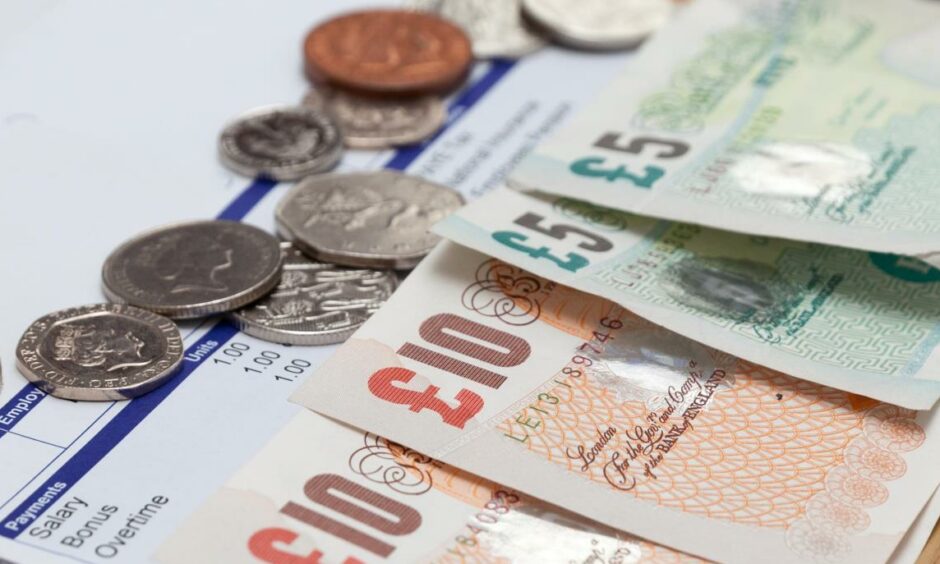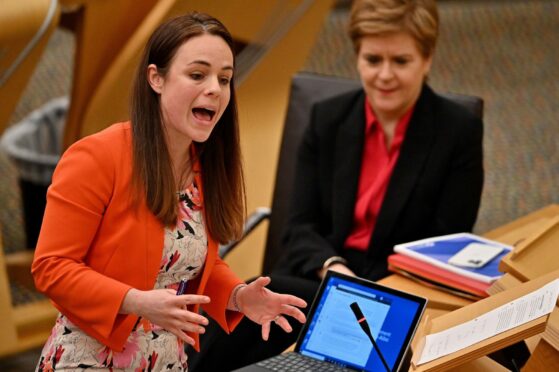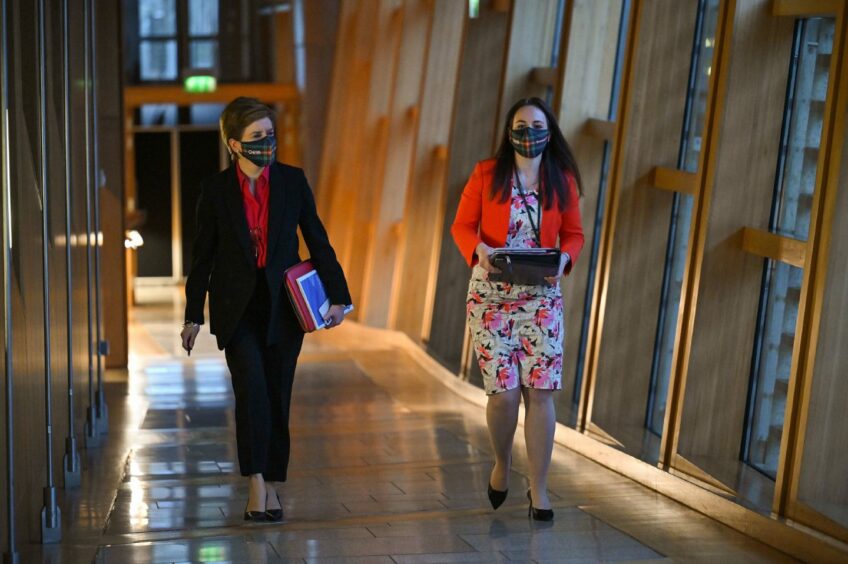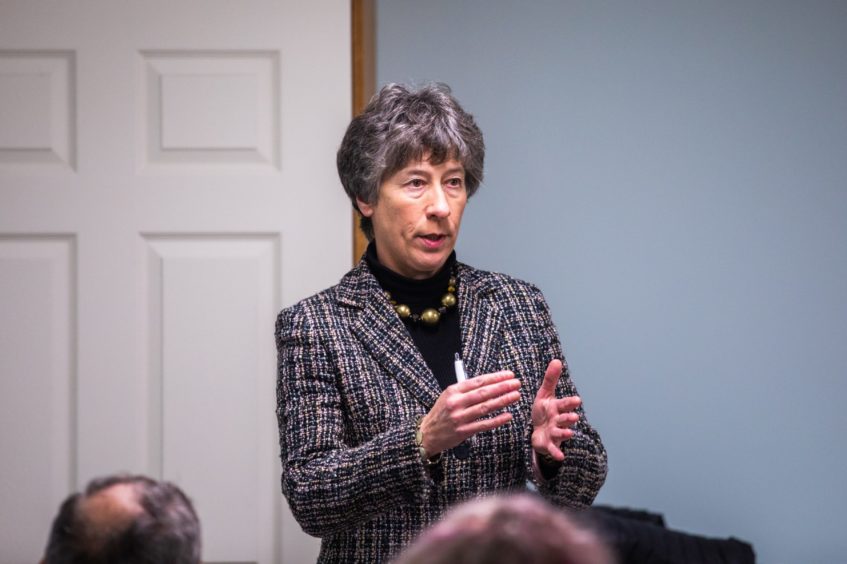Council tax payers are braced for higher bills next year after the Scottish Government announced a rates freeze will be lifted.
It means cash-strapped local authorities will be given full flexibility over council tax levels for the first time since the SNP came to power in 2007.
Finance Secretary Kate Forbes made no mention of scrapping the key SNP policy as she unveiled her budget for the next financial year at Holyrood on Thursday.
The confirmation came instead in a document on the Scottish Government’s website.
The paper – published minutes before Ms Forbes finished addressing MSPs – states: “For 2022-23, councils will have complete flexibility to set the council tax rate that is appropriate for their local authority area.”

It adds: “In setting council tax rates, we expect councils to take full account of local needs and of the impacts on household budgets of the decisions they make.”
It is not yet clear what the shift in direction will mean for local rate payers as council finance chiefs are likely to be pouring over the finer details for some time.
Council coffers have ben stretched thin for years and one city leader – who described this draft budget as “perhaps the toughest in recent memory” – said he fears for the impact of local services going forward.
Authorities were offered £90 million last year – the equivalent of a three per cent tax rise – if they agreed to freeze rates but there was no such offer on Thursday.
Rates, relief and welfare
Unveiling her spending plans, Ms Forbes said it was a budget of choices that had been “hindered” by Brexit and a loss of Covid-related funding passed on to the Scottish Parliament from Westminster.
She said income tax rates will remain the same.
Among the other key announcements, Ms Forbes confirmed:
- Business rates relief of 50% for retail, hospitality and leisure businesses will continue for the first three months of the next financial year while small businesses will pay nothing.
- High street firms with a rateable value of less than £15,000 will pay nothing in rates for the whole year.
- New-builds on high streets will also pay nothing in rates for 12 months after occupation.
- Land and buildings transaction tax will remain at the same level.
- The Scottish Child Payment is doubling to £20.
- A “minimum wage floor” for public sector staff will be set at £10.50 per hour.
Ms Forbes also said £20 million is being allocated from the wider £500 million “just transition” fund for the north-east and Moray. It aims to help smooth the path away from a reliance on oil and gas jobs in the region.
‘Absence of Covid-related funding’
Laying out the draft budget, Ms Forbes took a swipe at Westminster for not allocating “Covid-related funding” to the Scottish Parliament.
“The absence of Covid-related funding, despite the very real ongoing impacts of the pandemic, combined with the pressures of inflation, has meant that in this budget I have had to make choices,” she said.
“While this budget lays the groundwork for a green economic recovery from Covid-19, we must be clear that the UK Government’s spending review hindered rather than helped us on this mission.”
She added: “In practice, with Covid funding having been removed, our day-to-day funding next year is significantly less compared to the current year, at a time when we undeniably need to invest in the economy and help public services recover.
“This means the budget cannot deliver the resources all our partners will want and, let me be clear, there are areas where I would have wished to go further.”
A power sharing agreement with the Scottish Greens means the finance secretary will be able to lay out further multi-year spending plans in the spring.
Ms Forbes told the Scottish Parliament her “transitional” budget is a budget of tough choices but she believes she has made the right ones.
“It is a transitional budget, maximising funding where we can to deliver key priorities now but also paving the way for future fiscal choices,” she said.
Brexit taking a toll on spending
The finance secretary said the budget is smaller as a result of Brexit.
“While all other parts of the UK have seen a negative impact as a result of Brexit, the scale of that is three times higher in Scotland than in London,” she said.
“We said that Brexit would be bad for Scotland, that it would have a differential impact on our economy and, as is clear, it is, which is having a direct impact on our budget.
“Be under no illusion, the budget I’m presenting today is smaller than it would be if it wasn’t for the impact of Brexit on our economy, a Brexit that has been imposed on Scotland against the express wish of the people that live here.”
Scottish Conservatives finance spokeswoman Liz Smith accused the SNP of failing to protect jobs and local services despite receiving “the biggest ever block grant from the UK Government”.
In a reference to projects such as the dualling of the A96, Ms Smith said the influence of the Scottish Greens in government “seems to have put improvements to Scotland’s roads in the slow lane”.
“Vital infrastructure projects that would kickstart the Scottish economy are no longer a priority for the SNP,” she said.
“Kate Forbes didn’t take the opportunity to accelerate Scotland’s economic recovery from Covid. Instead, she used this Budget as an opportunity to try and provoke more baseless grievances with the UK Government.
“This Budget has mostly been the same old story from a tired government that is increasingly out of ideas.”
Council leader fears for local services
Dundee City Council leader John Alexander said the budget is “perhaps the toughest in recent memory” and he fears for the impact on local services.
“We won’t know the full impact of the budget locally for another week or two, when we receive a local government breakdown,” he said.
“These figures are high level and don’t allow us to accurately understand what this means for Dundee but this is usually the case at this stage in the budget setting process.”
Mr Alexander welcomed spending targeted at alleviating poverty and commended the finance secretary for the “balancing act she is delivering”.
However, he said that while he is “always optimistic, I remain concerned about the impact on council services going forward”.
He added: “Our councils provide vital services from education to parks, economic development to bin collections and we need to ensure that we continue to fund these vital services in a way that recognises their importance to the people of this city.”



